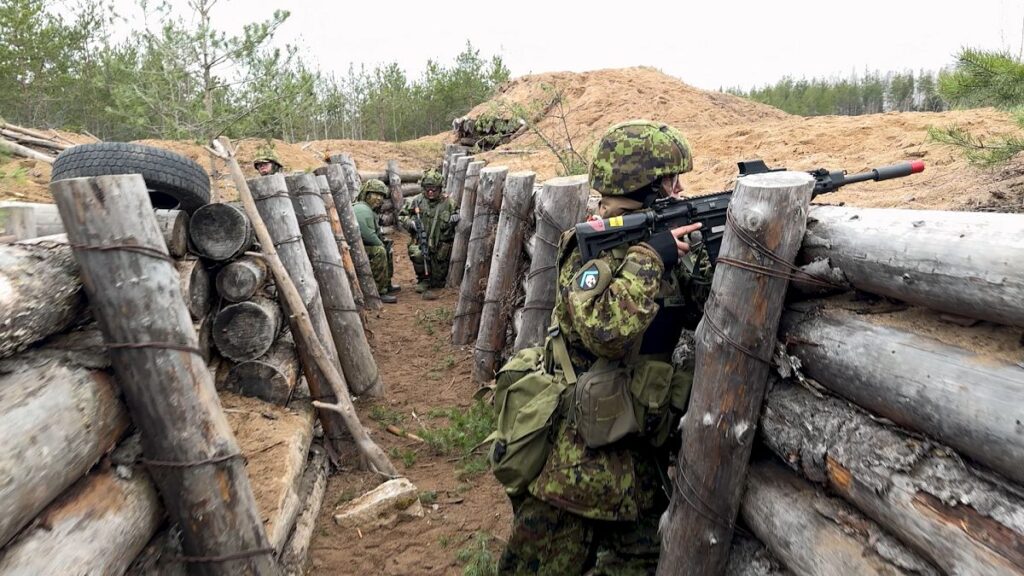EU member Estonia feels threatened by neighboring Russia. This year, this small NATO country will invest more than 3% of its GDP to strengthen its defense capabilities. How will this money be spent? And what will be the country’s defense strategy?
Estonia is organizing military maneuvers in cooperation with NATO troops from abroad, and is strengthening its territorial defense by training civilians for trench combat.
Our reporter Hans von der Brelie (@euronewsreport) carried out the investigation on the ground for Euronews Witness.
Meeting the Estonian volunteers
Indrek Jurtšenko trained as an opera singer. But today he’s taking me to a military exercise in the Estonian forests. Armed civilians, members of the “Estonian Defense League” (EDL), participate in a simulated battle with professional soldiers.
“Our exercise brings together 500 people from Estonia, Lithuania and France”he explains.
The exercise is called “Northern Frog” and takes place around a former Soviet military airfield. Near the airstrip, infantrymen from France, a NATO partner country, fortify trenches.
In the nearby forest, Baltic volunteers gather. It is armed civilians with professional military skills.
As part of these exercises, Estonian military forces and professional NATO troops test and improve each other’s combat skills for trench warfare.
What is, from a French professional point of view, the advantage of a militia force such as the EDL?
“Volunteers work in their living area, their area of belonging”Captain Hubert replies. “The great advantage of EDL is having this human resource immediately available, where you need it”.
Never again live under foreign domination
30,000 members have registered with the EDL. Workers, office workers, students or farmers who devote their free time to military exercises – voluntarily.
Many of them have their own gun at home. And they know how to use it when needed.
Never again live under foreign domination, that is Reet Saari’s motivation. This mother and sales manager in a hardware store runs a reconnaissance patrol, an exclusively female and heavily armed combat unit.
“Estonia is a small country, so everyone has to contribute to the defense efforts in one way or another. Some can fight on the front lines in the forest, like me. Others can participate in tasks support and logistics”she explains.
In maneuvers like this, Reet learned shooting, war medicine, infantry tactics and close combat.
A national defense effort
In Tallinn, the capital of Estonia, I meet Defense Minister Hanno Pevkur. Small Baltic country urges NATO partners to increase defense spending.
“2% of GDP is not enough”insists Hanno Pevkur: “The main threat will remain Russia. The dictatorship will spread”.
The Estonian Parliament recently voted maintaining defense spending at 3% of GDP. I ask the Minister of Defense what the country’s priorities are for 2024-2027.
“We are purchasing wheeled self-propelled howitzers, new medium-range air defense systems, anti-tank weapons and a lot of ammunition”explains Hanno Pevkur, who adds: “In the last two years we have purchased more ammunition than in the last 30 years.”
Is Estonia really in danger?
Estonia is currently exposed to numerous Russian destabilization efforts: airspace violations, disinformation campaigns, cyberattacks and GPS signal jamming.
Former EDL commander Riho Ühtegi, who also worked for Estonian special forces and intelligence services, considers NATO membership a strong guarantee, but says: “This feeling of the great empire of the past has not disappeared from Russia, it still exists. That is why we must be ready”.
NATO officers are full of praise for the well-trained civilian volunteers from the Baltics.
The militia fighters are able to improvise and find solutions to unpleasant surprises, even during stressful combat situations. The chains of command work well, reconnaissance and communication flows are professional, I was told during a few interviews in the field.
Some voices from Ukraine are sending alarming signals: Baltic states could be next on Vladimir Putin’s list.
But Article 5 of the NATO Treaty guarantees solidarity for each member state attacked: one for all, all for one. A view shared by Indrek Jurtšenko, Reet Saari, Hanno Pevkur, Riho Ühtegi, Captain Hubert and many others living within the Western Defense Alliance.


